#poor frederic
Text
FAQ: how to use astrology

artwork by frederic edwin church
disclaimer: there are, of course, many branches of astrology going back many hundreds of years, all with many uses depending on who you ask. location matters hugely too! different cultures and areas have, and do, use astrology differently. i have no experience outside of the uk so can't comment on this however. in this post, i'm talking about modern tropical astrology. as always, take what works and leave the rest <3
traditionally, astrology has been used for everything from academic research, medicine, informing politicians and farmers alike, and was considered an important science. nowadays, it has a poor reputation in some circles but is still a useful tool for lots of people, if used very differently. these days, it's mostly used on a personal level; astrologers still study carefully and make predictions about various sectors and generational changes, but the 'general user' is more likely to see astrology as some of the following:
a tool for psychoanalysis and self-development: this is how i got into astrology properly, as someone with a budding interest in psychology and a desire to improve my self-knowledge. learning about your natal chart, what the placements mean and how they interact with each other (and even with the placements of other people in your life) can be a really valuable tool for introspection and reflection, and ultimately, self-development and growth.
a tool for divination: this could be a post in and of itself, but to keep it quick, using astrology as a divination tool can be really helpful. keeping track of certain transits, like retrogrades, lunar transits, returns or just the daily movements of the planets and points around us can help us plan our time better, perform more effective rituals, be aware of when the time is (and isn't) right to make a big move, and feel more confident in our decisions.
part of a spiritual practice: this could be witchcraft, a religious or spiritual path you're on, or you just like to work with the moon. for example, you might want to incorporate elements of your placements in a spell, or perform a ritual during a certain lunar transit. you might use astrology in more of an 'old-fashioned' way in the form of an almanac, or avoid certain practices during mercury retrograde.
how i use astrology myself: i use it daily, as both a divination and a psychoanalytical tool. every month i consult my transits and jot down all the major/interesting ones in my planner, along with lunar transits as i love the moon lol. i use those transits to plan out certain activities, for example, a house clean every new moon, allowing extra travel time during mercury retrograde, carving out some time to relax and rest during certain lunar transits. i also feel i 'know what to expect' a bit, having done this (not as consistently as i'd have liked) for years, so for example i'm aware of how mercury retrograde affects me personally and can tailor my advice to myself a bit by now. i also consider astrology an integral part of my own spiritual practice, and i use it 'academically' to inform my tarot studies. never mind using it for this blog and for readings etc... it's definitely an important part of my daily life :-)
at the end of the day, whatever works for you, is what works for you. how do you use astrology day-to-day, if you aren't an astrologer? is it a big part of your life, or a bit of fun? how did you get into astrology, and was it a 'gateway' for you?
74 notes
·
View notes
Text
fuck it, expressionist film tumblr simulator
😇ProphetMaria Follow
the working class will have justice soon! the mediator will help us with his ability to communicate between the head + hands!
#maria speaks
(1,829 Notes)
💓frederfredersen Follow
Just found out that poor people exist?? Shaking crying throwing up
#I think it’s all my dad’s fault too
(8 Notes)
🤖xXMariaXx-19285793020 Follow
hi 👄 freder 😍 I’m trying to start 😩 a revolution 😳 against the aristocracy 👅 and bring about 💅 their destruction 🎀 haha i’m so 🏵 horny 👴🏻 rn 🤠 death 😈 to the machines 👑
💓frederfredersen Follow
idk if that’s a bot or my gf lol
(3,299 Notes)
🎪Carnage-Carnival Follow
I just want an androgynous goth twink I can keep in a box and show off in sideshows and force to commit murder against his will, but apparently that’s “malpractice” and “immoral” and “a postwar symbolic demonstration of the abuse of authority.” smh I think you all are just problematic and I hope you die <3
😴sleepycesare Follow
??
(5 Notes)
😴sleepycesare Follow
> 🥀yourbestfriendalan asks: “lol when am I gonna die”
at dawn i think
(399 notes)
🔎angrydetective Follow
ASYLUM DIRECTORS/CARNIES/SOMNAMBULISTS DNI
🎪Carnage-Carnival Follow
:)
🔎angrydetective Follow
I TOLD YOU NOT TO INTERACT!!! YOU’RE DAYS OF EVIL AND DESTRUCTION ARE OVER!!! I WON’T REST UNTIL I GET TO THE BOTTOM OF YOU’RE DREADFUL DEEDS!!!
🎪Carnage-Carnival Follow
*your
(8 Notes)
👑queenjane Follow
>🔎angrydetective asks: “will you marry me”
please stop spamming my inbox
👑queenjane Follow
I’m not going to marry you. why doesn’t anyone ever leave me alone. can I go FIVE MINUTES without some guy breathing down my neck
🎪Carnage-Carnival Follow
no :)
😴sleepycesare Follow
i am in . the your walls
(5 Notes)
💼hutternotharker Follow
just met my new client
💼hutternotharker Follow
he said my wifes neck is beautiful :) he’s so nice :)
💼hutternotharker Follow
the mosquitos here suck tho :( I keep getting bites on my neck
💼hutternotharker Follow
lol why does everyone here keep talking about vampires
(10 Notes)
🧛♂️countorlok Follow
“kill them with kindness” WRONG. plague of rats
(2,228 Notes)
🎈hansbeckert Follow
MINORS DNI SERIOUSLY I MEAN IT
🎈hansbeckert Follow
nvm minors interact!!! I have balloons
🎈hansbeckert Follow
NO
(30 Notes)
96 notes
·
View notes
Text
adventures in christian opinions about judaism
(reposted from Twitter)
So a while back I started writing a thing on the trio of parables that ends with the prodigal son (which I still need to finish) and like MAN OH MAN do Christian commentators insist that Jews hate shepherds.
Like, I can't even count the number of commentaries that insist that shepherds were "despised figures" for first-century Jews and the parables of the lost sheep and lost coin were designed to insult the Pharisees by comparing them first to a shepherd and then to a woman.
So, as is my wont whenever Christian commentators make a claim about what was normal for first-century Judaism, I decided to try to hunt down their source on this.
As I've said many times, when it comes to Christian parable interpreters' claims about what attitudes/beliefs/etc. were normal for first-century Jews, get used to the phrase "no sources are cited."
I mean, first off, as a 21st-century Jew, the insistence that 1st-century Jews hated shepherds rings odd, given that <checks notes> Abraham, Isaac, Jacob, Rachel, all of Jacob's kids (the founders of the tribes), David, etc. were all sheep-tenders. The image of God as a shepherd is pretty consistent throughout the Tanakh. That image reappears in the Qumran texts, which as far as I know, are one of the few Jewish sources we have from 1st-century Judaea.
The term "despised" gets used a lot, so I decided to dig into that one.




When I was able to find citations, I traced them back to an 1882 commentary by a guy named Frederic Farrar.
Farrar cites Heinrich Meyer as a source for this, but when I looked up THAT citation, it's Meyer saying that shepherds were a "lowly but patriarchally consecrated class" -- in other words, poor, but with a distinguished history and status.
So that's why everyone's tossing the term "despised" around--because Farrar just made it up. But what about primary sources? I went back on the hunt.
Surprisingly, in a number of reference works, like glossaries and Jeffers's "Greco-Roman World of the New Testament," I found similar assertions about the common attitude toward shepherds, for which they cited...
<drum roll>
Aristotle. You know, the Greek guy who lived 300 years before Jesus? Definitely a reliable source for Jewish attitudes of the time.
Some people cited Philo's On Agriculture. Okay, Philo was at least Jewish and lived when Jesus would have, although he was a wealthy Hellenized Jew living in Alexandria rather than a Pharisee living in the Galilee. But okay, at least it's the right culture and time period. (The reference in Philo turns out to be talking about the section of Genesis in which Joseph's brothers come visit him in Egypt. It talks about how they were proud to be shepherds, and criticizes (gentile) kings who look down on shepherds.)
Then we've got Mishnah Kiddushin, in which a bunch of rabbis are having a debate about which professions make you trustworthy vs untrustworthy, and one rabbi lists everyone from camel-drivers to herders to barbers to shopkeepers as untrustworthy. Another rabbi comes back and is like, nah, all those people are fine upstanding folks; it's doctors and butchers you've gotta watch out for. So they're citing one cranky dude with a LONG list of people he doesn't like, who immediately gets shot down, as evidence of the normative attitude for Jews about a century earlier.
Oh, and we've got a citation of Midrash Tehillim which says that God-as-shepherd doesn't have any of the failings of humans-as-shepherds, which... sure. Also, it was codified in the 1300s?
The most compelling citation is from the Talmud (Sanhedrin 25b), in which the rabbis discuss who's qualified to be a legal witness. They exclude shepherds, because shepherds graze their animals on other people's land, which some of the rabbis see as a type of theft.
The Talmud is a record of debates, but this passage definitely makes it sound like this is a majority opinion. (It should be noted that the passage disqualifies all KINDS of people, from those who lend with interest to those who fly pigeons, as having conflicts of interest.)
But the important thing here is that the Talmud includes records of debates from as late as the 4th or 5th centuries CE (300-400 years after Jesus's time), and the passage makes a point of noting that the disqualification of shepherds as witnesses is a later development.
So in other words, the idea that the Pharisees hated shepherds and would have been insulted by Jesus telling a story in which the protagonist was a shepherd is based either on Greek attitudes that are 300 years too early or Jewish ones that are 300-400 years too late.
But people will twist themselves into citation knots (or just not bother citing a source at all) to insist that this was a common attitude so they can position the Pharisees as hating those charming humble shepherds and their fuzzy little lambs.
As to WHY this idea seems to be so important to them, well, you cannot read about Luke 15 without encountering the word "outcast" roughly 90 times per page.
The framing is Jesus was friend to The Outcasts while the Pharisees despised The Outcasts and the Lost Sheep, Coin, and Sons are all parables about accepting The Outcast.
Never mind that neither the sheep, the coin, nor either of the sons got kicked out of their communities. The sheep wandered off, as sheep are wont to do, the coin was lost by its owner, and the younger son decided to leave to go on a spending spree while the older son declined to attend the welcome back party for him after his dad managed to hire a band and caterers but never thought to let his own son know what was going on and he had to find out from a hired hand.
Moreover, the term "outcasts" gets used as a synonym for "tax collectors and sinners." Tax collectors were usually pretty well-off because they ran a protection racket for the Romans. Outcasts? I mean, I guess? But hardly in the "marginalized and powerless" sense.
As far as "sinners," the NT doesn't usually bother telling us what, exactly, they did to "sin," but on the rare occasions when it does offer that context, it's almost always wealthy people.
But why talk about that when they can present the objection the Pharisees had to Jesus's dining with "tax collectors and sinners" as the Pharisees despising lowly outcasts, and insist that the Pharisees hated the idea of such people repenting and returning, and so Jesus was tweaking their noses by comparing them to shepherds and women.
As if, you know, teshuvah wasn't something the Pharisees were ALL ABOUT. If you want to actually understand, consider that the iconic tax collector in the parable of the Pharisee and the tax collector shows no inclination to STOP being a tax collector.
The objection wasn't you're having a friendly dinner with poor lowly outcasts for whom we have contempt. It was you're having a friendly dinner with people who are extorting their neighbors on behalf of the invaders who kill us for looking at them funny and have expressed no intention to stop doing that.
Now, there's a good discussion to be had about whether shunning Trump lawyers and Marjorie Taylor-Greene donors or inviting them to dinner and trying to win them over with compassion is more effective, more ethical, more compassionate (to whom?), etc.
But presumably we can see why people of intelligence and goodwill might disagree on which of those approaches is the right thing to do, and why such people might might object to the strategy they don't agree with.
But what really gets me is that Christians have the utter fucking NERVE to paint the Pharisees as inhumanly awful for not wanting to have dinner with tax collectors while viewing Corinthians as Holy Writ:

I mean, Paul's all YOU MUST SHUN ALCOHOLICS AND PEOPLE WHO ARE GREEDY and Christians are like yes, that makes sense, but if the Pharisees are like, no, I don't want to have dinner with that guy who narced on my cousin and got him crucified, Christians are like, they're monsters.
Cool, cool.
Anyway, this has been your weekly edition of Christians Need To Stop Just Making Shit Up About Jews And Then Citing Each Other Like It's Fact.
And there were a lot of "I've never heard anyone say Jews of Jesus's time hated shepherds..." responses: Maybe you haven't, but that doesn't make it uncommon.
Sources in which I've found it:
Craig Blomberg (Denver Seminary, Society of Biblical Literature, Tyndale House, NIV translation committee)
Jared Wilson (professor at multiple Baptist seminaries)
Stephen Wright (Spurgeon College (British evangelical college))
Arland Hultgren (Luther Seminary (ELCA))
Kenneth Bailey (Presbyterian/Episcopalian)
Joachim Jeremias (Lutheran, cited EVERYWHERE)
Bernard Brandon Scott (Disciples of Christ, the Jesus Seminar)
Klyne Snodgrass (Evangelical Covenant Church)
Barbara Reid (Catholic Biblical Association)
That particular trope spans denominations, decades, etc. It's not a fringe viewpoint.
#christian exegesis#antisemitism#jumblr#citational politics#bad methodology#parables#pharisees#first century judaism#second temple judaism#good shepherd#prodigal son#why are christians like this?
366 notes
·
View notes
Text

Blessed Rosalie Rendu
1786-1856
Feast Day: February 7
Blessed Rosalie Rendu was born in France during the chaotic French Revolution. Her life was one of prayer and charity which led her to enter the Daughters of Charity, eventually becoming the superior of the Paris convent. She served the poor, opened a free clinic, pharmacy, schools, orphanages, childcare centers, homes for the elderly, youth clubs for young workers, and cared for the wounded between both sides of warring revolutions. She worked closely with Bl. Frederic Ozanam whose work became the St. Vincent de Paul Society. She died of frailty and fatigue from a lifetime of incredible work.
Prints, plaques & holy cards available for purchase here: (website)
35 notes
·
View notes
Text
Bonus
Happy particular Monday! Here’s a story for it, which came about mostly because I wanted to put a couple of people into a clichéd situation, and then I had to do leadup and aftermath... anyway, it’s intended to be a two-parter (yes, I know; aspirations) set in a not-entirely-canonical season 4, in which the Warehouse did get brought back and Helena did leave without explanation, BUT Artie doesn’t go full Father Data and Leena doesn’t suffer the consequences—mostly because Mrs. Frederic has sensed some badness to come and thus sent Artie and Leena away. Because why not? Also I have Claudia jumping into Caretakering, and even a bit of Artieing, with some enthusiasm.
P.S. I know I haven’t yet finished last year’s Christmas story—that’s a pain point—but I genuinely am working to get back on various horses, including that one. Weather (in all senses) permitting.
Bonus
“I genuinely cannot believe we’re stuck in an elevator,” Myka says. It may be the most true statement to which she’s ever given voice.
****
SEVERAL HOURS EARLIER...
Myka’s reasonably pleasant thought, burring along as background to her monotonous tasks, is I don’t mind this. She and Steve are in the Warehouse office early in the morning, doing file inventory, and it’s true: she doesn’t mind it. It’s a little lacking as a holiday activity, but with Artie, Leena, and Pete all away, “lacking” is pretty much the flavor of the moment.
Claudia pokes her head in and says, “Ping.” She’s unenthusiastic, speaking of lacking. Where’s the usual revving about what it might be this time? “At some midwestern accounting firm, because it’s important to have a boring Christmas.”
Ah. “An accounting artifact?” Myka asks. Speaking further of lacking: here, it’s artifacty zing. Then again, artifacty zing got Myka trapped in Alice’s mirror, among other catastrophes, so maybe boring isn’t so bad. “Balance sheets?” she ventures. “Pluses and minuses?”
“Some people at this pingy company just got extremely large Christmas bonuses,” Claudia says, “and some got their pay extremely docked. So yeah, ‘balance sheets, pluses and minuses’ just about covers it. Probably. I mean, I might be trying to manage expectations here.”
Claudia’s certainly right, in that getting one’s hopes up—about anything (or anyone)—is a fool’s game.
But still, there’s something to be said for boring-but-remunerative, even if only for some people... what a nice idea. “I’d like a Christmas bonus someday,” Myka says, “instead of a Christmas penalty. Which I think pretty accurately describes the Pete-plus-artifacts situation.”
“It’s two days before Christmas, and he hasn’t done anything yet,” Claudia says. “That you know of,” she amends.
“Because he’s been with his family in Ohio for the past week,” Myka points out, and she’s gratified when Claudia rolls her eyes. It’s practically a concession.
Steve says, “It’s inappropriate to say ‘Christmas’ bonus these days. It’s ‘end-of-year.’” The contribution suggests he’s listening with only one ear.
“I wish appropriateness mattered here,” Myka says, not really to him but in general. Who knows how a Warehouse HR department would make heads or tails of the application of employment laws—much less employment niceties? “Not that it makes a difference. Christmas, end-of-year... call it Fred, and we still wouldn’t get one.”
“If I ever do get a bonus, I’m absolutely naming it Fred,” Claudia declares.
Myka shakes her head. “Poor Fred. Doomed to be injected right back into the discretionary economy.”
“Inject-o-what are you even talking about?”
“Just a guess, but: you’d spend it on things you don’t need.”
Claudia harrumphs. “Thanks for lumping me in with the avocado-toast-and-Starbucks crowd. My fiscaling is way more responsible.”
“Really? What would you use Fred for?”
“Asus VG278HE gaming monitor. Plus a graphics card, maybe the Nvidia GTX 690, depending on how hefty Fred is.” At Myka’s snort, Claudia challenges, “Fine, where would you inject it?”
“My Roth IRA,” Myka says immediately. She’s not sure what assets her evil, crazy, or dead self will need in retirement, but given the many and varied forms each of those, or combinations thereof, could take, it seems like a good idea to have a financial plan in place. That’s another thing a Warehouse HR department might be useful for...
“You’re the actual human manifestation of an accounting artifact,” Claudia accuses. “Speaking of which, here’s the deal. I gotta stay here—some Mrs.-F homeworky stuff—and Steve’s busy reassuring all the misfit toys in the building that Leena hasn’t deserted them forever. And I’d say ignore the ping entirely, but your never know what’ll go viral, and I bet Artie’d say the last thing we need is another financial crisis. Or maybe you’d say it. Anyway, you’re it. And for your backup, when you get to Cleveland—”
Myka groans. “Cleveland? Seriously? Pete’s going to be so mad about you pulling him away from the family.”
“I’m not pulling him away,” Claudia says, blinking like she’s some innocent little lamb.
Myka groans again. “You’re making me do it?”
Claudia shrugs. “Sure. Why not. You’re partners, right? But here’s some advice: wait till you get there to call him. You know, put off the misery, if that’s what it is, as long as possible. Besides—more advice—I really think you should spend your travel time thinking about bonuses. Who gets ’em and why. Because what’s a bonus, really?”
“An economic stimulus whose nametag reads ‘Fred,’ if I’m understanding things correctly.”
“We’ll see what you think about that when you get to Cleveland.”
“On the day before Christmas eve,” Myka grouses. “By the way, that’s a whole lot of ‘advice,’ coming from somebody who’s over a decade younger than I am and not technically my boss.”
“By the way,” Claudia mimics, archly mocking, “we’ll see what you think about that too.”
“When I get to Cleveland?”
“When you get to Cleveland. On the day before Christmas eve.”
“Sounds like the title of a lesser Christmas carol,” Steve says—he’s tuned back in to the conversation. He then says, with his grin that curves so impish, “Think we could get Mariah Carey to sing it? It’s a hit if we get her, right, no matter how lesser?”
“‘When You Get to Cleveland on the Day Before Christmas Eve?’” Claudia skeptics. “Hit-wise, that’s gonna need a lot more power: Mariah dueting with Darlene Love at the very least. Plus we’ll need a Destiny’s Child reunion for at least one chorus.”
“Thanks for reinforcing my sense of how awful this is likely to be,” Myka tells them both, and Steve’s grin turns apologetic.
Claudia, however, shrugs. “Maybe you’ll sing it different.”
Myka is now the one to roll her eyes. “I won’t sing it at all.”
Surprisingly, Claudia doesn’t go with another eyeroll. “We’ll see,” she says, and Myka is struck by the Mrs.-Frederic resonance in her words. Does the homework include practicing the enigmatic tone?
Steve looks up and catches Myka’s eye. He winks. Myka would wink back, but he would probably interpret that as her saying she understands what’s happening. And that would be a lie: serious enough, probably, to make him wince and massage his temples.
So Myka just blinks—not Morse or any other code, just basic eye-moistening blinks. Then she goes upstairs to collect her always-packed travel bag for her trip to Cleveland.
****
Her flight departs late, of course; it’s December in South Dakota. But that’s this-time fine, because it allows Myka a necessary excess of opportunity to prep her Pete-placation. Under her breath, she practices the delivery of such words as “shorthanded” and “necessary,” aiming for maximum sincerity.
When she at last emerges from her Cleveland Hopkins jetway, that extensive prep deserts her entirely, for what awaits her is the manifestation of a Christmas wish she has worked overtime to convince herself would not, could not possibly be granted:
Helena.
Whose arms are crossed, and whose posture betrays that her foot might recently have been tapping out impatience with the plane’s tardy arrival. The attitude is so normal, so entirely of-the-world (rather than of-its-imminent-end), that Myka wants to reverse course, get back on the plane and redisembark, just so she might meet it again, meet it and refeel this wash of absolute relief at seeing Helena impatient in an airport.
Devious, Claudia, Myka thinks. Outstandingly devious. “Hello, Fred,” she murmurs, then tries, in the ten seconds she has before she and Helena are in proximity to speak, to engage in a far more consequential prep.
For Helena has been gone—has been, as Myka put it to Steve not so long ago, “god knows where”—since shortly after the Warehouse did not explode. She was there, in the Warehouse, but then she was gone, and Myka was told only that Helena had “matters to attend to.” God presumably also knew what those matters were, but Myka hadn’t, in the wake of that first moment of absence, and hasn’t since, been able to pry any information about matters or their whereabouts out of anyone, divine or otherwise.
And through the seemingly endless wondering, Myka’s mind and heart have gnawed themselves ragged.
Until this moment, when the wondering and gnawing end: now her blood speeds, coursing with urgency even as everything else seems to slow.... her movements, her reactions, her thinking, all are sluggish, unresponsive; only her blood matters. This blood knowledge. For all her wondering, she’s been avoiding gnawing her way to that answer.
“Claudia said you needed backup” are Helena’s words when they meet.
Myka’s attempt at prep has fallen grievously short—not that she could have risen to such an occasion, not when hearing that voice for the first time in some time, and certainly not when faced with what her blood’s embarrassing insistence has forced her to confront anew. “I... assumed I’d be calling Pete,” she says, to at least go with truth.
“Interesting assumption. Perhaps necessary, if you believe I’ll be insufficient.”
Myka’s impulse is to reassure: “More than sufficient—you’re necessary,” she would shout, or better yet, whisper. Instead, because Helena’s tone is neutral—is she in actuality indifferent?—she falls into a defensive, businesslike crouch, offering only implicit denial of the premise of Helena’s statement. “Let’s head for the accounting firm,” she says, internally cursing herself.
Cursing, but also justifying: Helena is here as backup, thanks to Claudia’s cleverness, and Myka should not assume (speaking of assumptions) that she even wants to be here. All focus should be on retrieving the artifact. Certainly on that and not on Myka’s (honestly) predictably overexcited blood.
She tries to concentrate on Claudia’s advice (while at the same time trying not to resent her success at being cryptic about it): what’s a bonus, really? Helena’s presence, the sight of her, the apprehending of her impatience, the experience of blood: whatever else may happen, these have been—must be—are!—the bonus.
****
The cab ride is quiet. Myka’s resolve to think only of backup and bonus is dissolving by the second, and she lets words reach her tongue that might start a conversation with Helena about things... but those words don’t escape her lips, for a strand of formality seems to be stiffening Helena’s spine. Does she know how Myka cherished her impatience? Is she attempting to discourage such adoration?
Myka, in regret and relief, follows that more-strict lead.
That’s a bonus too, though, for it turns the ride into unpressured, liminal time, perfect for simply basking in presence. It’s best, Myka is now thinking, to treat this reunion as something that was of course going to have happened. For backup or other professional purposes. Despite the fact that it’s the thank-god fulfillment of recurring, desperate dreams.
However: at one point in the traffic-backed silence, Helena, completely unprompted, turns and smiles at Myka.
Myka smiles back.
It’s a previously missing puzzle-piece slotting into place... yet in its aftermath, Myka finds herself having to push with force against a will to worry over other missing pieces; in particular, she must fight the fret-intensive futility of trying to count them.
****
They find the accounting firm’s lobby spacious but quiet—holiday-low staffing, presumably. Myka asks the receptionist, “Is there someone we can talk to about end-of-year bonuses? Also penalties?”
“I’m a temp,” says the young man. His tone suggests it’s his answer to every query... but then he adds, very quietly, “Unofficially, there’s this one guy...”
That has the ring of “artifact,” so Myka nods, encouraging him.
“Super-vocal about his paycheck the other day. How tiny it was. I mean, he’s the kind of guy you might have theories about what else is tiny, but I—”
“Who was that?” Myka interrupts, even as she feels Helena’s readiness to laugh. Mr. Super-vocal is thus probably not a wielder of an artifact; more likely, one of that wielder’s... victims?
“Bob,” the temp says. “I’m sure he’s got a last name, and I’m sure he thinks everybody should call him ‘Mr. Lastname,’ but my care level? Anyway he’s down the hall—one of the only ones in the farm today. Spite-working. Maybe on his anti-everything manifesto.”
“Down the hall” turns out to be a vast expanse of cubicles: definitely a farm.
Myka says to Helena, “Follow my lead?”
“Always,” Helena says.
It’s a tonally sincere utterance—and in that, admirable—but it’s also manifestly untrue; nevertheless, Myka’s blood decides to believe it, to recognize it as another puzzle-piece. I really need to function, Myka tries to explain to her interior. So if we could climb down just a couple rungs. Like to the cab-ride level, maybe?
Her body refuses the agreement.
Of course.
The occupant of the first inhabited cubicle they find is an over-coiffed middle-aged man who clearly spends far too much time in tanning booths. He’s typing aggressively, as if the force of his keystrokes will power his message. His manifesto?
“Are you Bob?” Myka asks him.
“You better be here about my money,” obviously-Bob says, clearly spoiling for a fight.
Myka finds his demand incongruous—his job has to do with other people’s money, and Myka and Helena are manifestly other people. Who could have money. Fred or otherwise.
“In a way,” she says. She follows up with “We’re from the IRS,” and it’s never not funny for that to be useful. Bob winces, as if she's about to strike him. Also never not funny. “We’ve noted some suspicious discrepancies in end-of-year reporting.”
“You have?” Bob asks. Now he’s avid rather than confrontational.
“Looks like some overreporting. Also underreporting. So you see our concern, particularly about effects on withholding.” She is making this up, as she generally does whenever she has to go actual IRS on someone. Read up on tax law, she reminds herself, as she generally does every time. Not that she’ll ever have the leisure to do that... “What we need to find out is whether it was in error, or if it warrants a full investigation.”
“Nancy Sullivan,” he says, with contempt, the name itself a curse. “She’s the one you should investigate, and then send straight to jail. She’s always been a witch about year-end, but now? On steroids. Talking about making her list, threatening to mark down people she doesn’t like, including yours truly, as naughty... and then we got our paychecks, and somehow she did it! No idea how she managed to push that garbage through, but I swear you better get her up on some kind of charges!”
He rises abruptly, clutching a slip of paper; his chair topples over behind him. He shoves the paper in Myka’s direction, his knuckles nearing her astonished nose—but in the instant before contact, Helena intervenes, her arm blocking his, stopping his forward motion.
Backup.
Helena plucks the paper from his pushy hand. “And what’s this?” she asks.
A pretty minimal manifesto, Myka thinks initially. But then she replays his screed in her head, and his babbling about Nancy Sullivan resolves into meaningful references; struck by the realization, she very nearly misses his next statement: “My pay stub. She can’t just do this.”
Helena says, “Of course not.” She’s soothing him, her voice a faux-caress. It’s enough to tempt Myka to act out, just to hear it directed her way, even as Helena continues, “But we understand some of your colleagues, to the contrary, received large bonuses.”
His “tanned” skin darkens further. “Guess she thought they were nice. To her. Suck-ups.”
Mya looks a Find out anything else that’s relevant at Helena, who nods. Retreating back to the pre-cubicle hallway—relieved that her nose is intact—she Farnsworths Claudia. She skips the pleasantries, starting with, “A very disgruntled employee says the woman who signs off on bonuses was making a list.”
Claudia chortles. “You’re hilarious. Was she checking it twice?”
“This is my point. We don’t know exactly what we’re dealing with, not yet, but I bet that’s the crux.”
“I should’ve known you weren’t aiming for hilarity. So you really think this is some Santa thing?”
“No. I’m saying words about lists because I think it’s a grocery thing.” Myka wants to shake her fist at the heavens and every deity who occupies it. Occupies them. All the heavens. “Of course I think it’s a Santa thing! I also think it’s Pete’s fault somehow.”
“Just because it’s Christmas? C’mon.”
“Christmas and Ohio?” Myka snorts. “You c’mon. I don’t believe in coincidence.”
“Maybe you should though. For peace of mind?”
“That’s another thing I don’t believe in. Just see if you can find anything about a Santa’s-list artifact, would you?”
“Roger. By the way, how do you like your backup?” She chortles again and disconnects.
“I like my backup like I like the sunrise,” Myka tells the blank Farnsworth screen.
“What about the sunrise?” Helena asks from directly behind her.
Myka wishes the sound of her voice were either more or less startling. She wishes also that she knew exactly how much overhearing had occurred.
“It’s inevitable,” she sighs.
In response, Helena blinks.
They take the elevator to Nancy Sullivan’s office.
In that elevator, which is aggressively mirrored, Myka can’t help but glance repeatedly at herself. So many reflections. You called this into being, thinking about Alice’s mirror before, she accuses. She tries not to focus on how her hair could really stand to be more controlled... she’d focus on Helena instead, but who knows how that would be received? Instead she allows herself one glance, then looks down.
She likes being on the elevator with Helena, though; it’s a space of relative privacy, like the cab. Have they ever before been on an elevator together? Alone or otherwise? She runs through their interactions, fast-forwarding from the Wells house to D.C., Tamalpais to Moscow, Yellowstone, Colorado Springs, Ohio (here Myka trips over the fact that Helena’ s now been to Ohio twice, if only once in physical form), Pittsburgh, Hong Kong...
The review—the speed with which she can conduct it—reminds her of how limited that time has been, so: an elevator ride. Yet another bonus.
“That fellow,” Helena remarks, and Myka looks up again; their eyes meet in the mirror of the elevator’s doors. It’s uncanny, as if they’re both holograms, so Myka turns her body toward Helena, who meets Myka’s actual eyes and continues, “He attempted to make a lewd joke about his willingness and ability to be naughty when it’s called for. I pretended not to understand.”
Myka can’t help it: she snorts. “I bet he didn’t buy that for a second.”
“I have the ability to perform ‘prim’ when it’s called for,” Helena says, and Myka has to acknowledge that statement as good evidence of itself. Then Helena’s face reshapes into a devilish grin as she says, “In a slightly different vein, his quailing at those three letters with which you assailed him? Hilarious.”
“Letters?” A little perverse-quirk makes Myka want to hear Helena say them, though she’s probably not pulling off “disingenuous” in making the request.
Helena seems fine with the perversity, for she obliges: “I,” she begins, then draws out “Aaaaare.” Then, after a beat: “Esssss.”
Myka now herself feels assailed—by how right Helena’s reading her. She tries to step it down with, “I wasn’t aiming for hilarity. I never do. Claudia can vouch.” But she does spend a little moment thinking about the context of that previous assailing: we’re from the IRS. We are here, together, from an agency. We, together, represent. It isn’t by any means everything Myka would have wanted... but it’s something: part of this bonus. “Fred,” she says, sotto voce.
The office they’re seeking is on the building’s highest floor, suggestive of Nancy Sullivan’s bonus-approving rank; it features several large windows, one of which affords the office a view of the hallway, and vice versa. Through it, Myka and Helena watch a woman, presumably that powerful Nancy Sullivan, writing with a quill-esque pen.
“It’s the pen,” Myka says, because it has to be. “It’s always the stupid pen.”
“Always?” That’s unusually tentative, like Helena’s trying not to step.
“Okay, once,” Myka concedes. “My dad and Poe and a pen, and as a result I’ve developed a severe aversion to those quill things.”
Helena takes a beat. Then: “I never liked feather pens.”
“Are you just saying that,” Myka says, because she might be, and she might admit it, and that might be good or bad or something else Myka has no way of evaluating. Why does Helena say words like this? And for that matter, why does Myka keep spending her limited time on this planet trying to parse them?
“Yes? In that I’ve... said it?”
That really didn’t help with any of the whys. “I mean, just to make me feel better?”
Helena shrugs. “The fact is, today’s ballpoints et cetera are far more reliable. Does that make you feel better?”
She’s playing at being obtuse—surely that’s for a reason? But Myka has no time to wonder further, for Helena is knocking on the office door and opening it without waiting for an invitation, and the real retrieval is underway.
Myka flashes her badge. “I’m Agent Myka Bering, and this is Helena Wells. We’re from the IRS.” She glances at Helena—all these glances!—and gets a small smirk in response.
Rather than introducing herself, the woman says, “Really? I bet that’s not true.”
“Why?” Myka asks. Have she and Helena, over the course of the elevator ride, lost their ability to perform “official” correctly?
“I have a feeling you’re here for this,” Nancy Sullivan says, and she lofts the pen, waving it like a wand. “Mostly because I also have a feeling that I want to close my fist around it, punch my way past both of you, and make my escape.”
Well. “That’s self-aware,” Myka says. “Unusually so.”
“Thank you? Although it’s less self-awareness than kind of a... sixth sense.”
Helena raises an eyebrow at Myka. “Sixth sense aside, we appreciate your good sense to refrain from attempting to punch your way past us. That would have ended poorly.”
“I wish I’d had the good sense not to use this pen,” Nancy Sullivan says.
“Is there a reason for your wish?” Helena asks. She sounds, to Myka’s ears at least, like a recently summoned, slightly flummoxed genie.
“Because of how much I liked using it—particularly when I realized nobody was going to question anything. I signed off on all these orders, and it was like...” she trails off. Then she concludes, “Magic.”
To keep her talking, Myka prompts, “Was it?”
“Having the power to reward good people has been fantastic,” Nancy Sullivan continues, “but penalizing the awful ones? I mean I’ve sort of resented feeling compelled to use the word ‘naughty’ about them, because that’s way out of character for me. But other than that? Utterly spectacular.”
“Bob,” Helena suggests.
“Oh, god, you met him?”
Helena offers a dry “Alas.”
Nancy Sullivan’s smile is as dry as Helena’s tone, astringently vindictive. “I could not have been more thrilled to hit him and everybody like him where it hurt... I admit I’ve always been kind of judgmental, but wielding this pen? Intensified. Like, the hates are more. In particular, the hates are more. I’m not saying the Bobs of this company didn’t deserve what I did, but I feel it more. Punishment. It’s satisfying, but also weirdly costly. Grinch-in-reverse costly.”
That’s a little on the nose. Myka glances at Helena again, because the satisfactions of punishment, of judgment, even of hate, are among the things they will need to talk about. Maybe. Someday. If they are to have a someday that is theirs... if that is even possible after so much time and tribulation... Myka lets the glance grow into a gaze, a resting regard, and it stays that way until Helena, too, glances, with the result then that their eyes meet and lock... such a clasp, Myka feels, could ground that potential, and potentially necessary, talk of things, if only they were not in the middle of a retrieval...
...which makes Myka think. Why are they in the middle of a retrieval?
“I wish I didn’t feel like I need to articulate this, but where did you get the pen?” she asks. Because she has a niggling sense of something larger happening, something beyond her grasp. Nevertheless, it is not—repeat, not—a vibe.
Fine. It might be a vibe.
“My cousin gave it to me,” says Nancy Sullivan.
“Your cousin,” Myka says. “Whose name is?” Now she’s knows what’s coming, and that has nothing to do with a vibe: no, it is entirely deduction based on experience.
“Pete Lattimer.”
TBC
#bering and wells#warehouse 13#fanfic#Bonus#holiday (but not Gift Exchange)#proceeding at a vaguely nonzero speed#being left in the dust by snails and tortoises#but I do still love a Myka who fights with herself about who deserves what (and why)#and of course a Helena who can be reasonably inferred to do the same#struggling against the graceful acceptance of gifts#whatever form they take
50 notes
·
View notes
Text
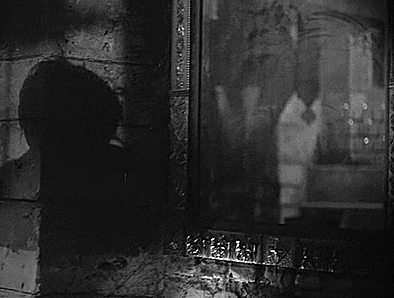
I rewatched the 1941 Dr. Jekyll and Mr. Hyde tonight-- and I ended up really liking it. For years, I have disliked this movie mainly due to how MGM tried suppressing the 1931 Frederic March version to promote their glossier remake. However, I must have been more chill tonight, because I really enjoyed it. It's not a bad movie at all and there are plenty of great moments. I've come around on Tracy's more "interior" take on Hyde (he is genuinely gross and chilling) and while this movie has a reputation as being more "buttoned up" than the pre-code version, it's still mainly centered around sexual repression, sexual sadism, and sexual abuse.

I mainly rewatched the movie for Ingrid Bergman, who plays "bad girl" Ivy, the woman Jekyll/Hyde lusts after. Bergman has a similar problem to Audrey Hepburn in the first half of My Fair Lady in that she's not too convincing as an ill-mannered woman from the gutter. She exudes class, even when dropping a casual "ain't" into her dialogue. However, the emotional content of her performance is stunning. The scariest thing about this film is Hyde's abuse of Ivy and how it transforms her from a flirty, vivacious individual into a frightened, paranoid wreck. Bergman is heartbreaking and more than anything else, her suffering makes you despise Hyde.
I still prefer the 1931 movie, which is better paced and more frank, but this film is good in its own right and doesn't deserve the poor reputation it still has among classic horror buffs.
#dr jekyll and mr hyde#dr jekyll and mr hyde 1941#ingrid bergman#spencer tracy#victor fleming#lana turner#thoughts
81 notes
·
View notes
Text
Adopted Varian AU
Queen Arianna was told by the captain that Old Corona had been attacked. She rushed to the village, hoping she could do something to help the poor villagers.
But she was too late. They were all gone. Devoured in the flames that consumed the entire village.
Upon gazing mournfully at the charred village, Queen Arianna heard distinct cries in the distance. Beyond a crumbled building, she found a boy cradling his father in his arms as he wailed. She gasped when she recognized the marking on the man's hand.
It was Quirin.
The husband of her best friend.
He lay lifelessly in his son's arms.
Queen Arianna immediately recognized the boy. Ulla's only child. Varian, a boy truly ahead of his time. Her heart shattered when Varian looked up at her with broken eyes. She crouched down beside him and held him in her arms, letting him sob. She stared down at Quirin's body and choked back tears.
This poor child. First his mother, and now his father. He was all alone. He had no one left. What was going to happen to him?
Upon hearing Varian cry out for his father, Queen Arianna made a decision that would change her family's life forever.
She would raise Varian as her own.
He needed a home. He needed someone to love him. She needed to provide that for him. For him. For Ulla. For Quirin.
Queen Arianna returned home that night with the helpless boy. Her husband took one look at him and instantly knew what happened. He and Arianna exchanged looks, and she knew Frederic agreed with her decision. She could see the pain in Frederic's eyes when he looked at Varian.
Queen Arianna wasted no time. She had a room prepared for Varian, fresh clothes, and a warm meal. She told the staff to be careful of waking her sleeping daughter.
At first, Varian didn't comply. He was still in shock. But slowly, he came to.
The first night was rough. He could barely stop crying. Arianna stayed with him the entire night. She didn't say a word and neither did Varian. She just held him in her arms and hummed to him until he cried himself to sleep.
As his soft snores replaced the sniffles and whimpers, Arianna looked out the window. She gazed at the stars and said in a soft voice,
"I will protect this child with all that is in me. I promise you, my friends. Your son will be alright."
By, MyDarlingNyx
Please leave any feedback or comments below!
#varian tts#varian#tangled the series#rapunzels tangled adventure#tts rapunzel#story prompt#writing#wattpad#short story#rapunzles tangled adventure#vat7k#varian vat7k#ulla vat7k
59 notes
·
View notes
Text
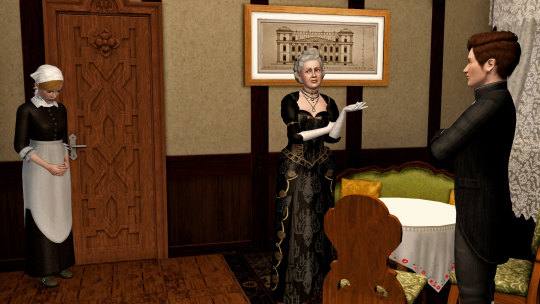
Jonathan: Good afternoon, Mylady. What can I do for you?
Mrs Warren: I think you know what this visit is about. I’m an old woman, I don’t have much time left. It’s time I drew up my final will, and that’s when poor Sarah came to my mind. It was entirely her own fault of course, but Frederic needn’t have been so miserly about it. Well, then you took her in, so she didn’t need our help any more. But now I wish to have a look at the child, to determine a suitable way to mention it in my will. Not as legitimate offspring of course, but mention it nevertheless.
Jonathan: Sarah, please go and fetch Mary.
34 notes
·
View notes
Text
Demeter and Persephone: The love between mother and child

The Return of Persephone painted by Frederic Leighton (1891)
Recently, the myth of Demeter and Persephone (AKA The Myth of The Seasons) was reinterpreted as “Hades and Persephone” and it’s being treated as a love story. The supposed purpose of this reinterpretation was to make it empowering to young girls by giving Persephone some agency. However this “agency” comes at the price of transforming Demeter into a controlling mother.
This purpose is kinda funny because, when I first read it at the age of 6, the myth wasn’t sugarcoated. When Hades took Persephone away, it was addressed as a kidnapping and made clear that Persephone screamed as she was being abducted. It was never expressed if Persephone loved Hades or not but it was shown that her being trapped in the underworld made her sad because she couldn’t see her own mother. The only thing omitted was the incest aspect of the myth (Persephone being a daughter of Zeus, making her Hades’ niece, and Demeter being Zeus’ and Hades’ sister). After I read it, I didn’t thought that Persephone’s situation was cool, I thought “It’s not fair! She misses her mom! She should be allowed to see her mother whenever she wants to!” And I also thought “Poor Demeter! She shouldn’t be forced to be apart from her daughter! Can’t they see she’s suffering?!”
The myth isn’t about romantic love, it is about the love between mother and daughter. The creation of the seasons was a way to show the sadness of the separation between mother and child and the happiness of the rencounter.
Calling Demeter a “controlling mother” is rather baffling considering the other gods involved in the myth. Zeus controlled Persephone by giving her to Hades without asking her consent, Hades controlled Persephone by kidnapping her and, depending of which version you read, EVEN Aphrodite controlled Persephone by making her son Eros shoot one of his love arrows on Hades for the simple reason that Aphrodite didn’t want another virgin goddess because that means she would lost influence over Persephone. Of all the gods, Demeter was the only one that really cared about Persephone, trying to give her daughter a life without drama.
When Demeter made the earth infertile in order to Zeus bring Persephone back, she wasn’t being narcissistic, she was showing the lengths a mother would go for the sake of her children. If it is for the well-being of her children, a mother would confront even the king of the gods!
Please don’t take this post as an attack to people that enjoys the reinterpretation of The Myth of The Seasons, however do keep in mind that Demeter is not a controlling and narcissistic mom. She’s protective at best.
And if you perhaps know a reinterpretation of the myth that doesn’t put Demeter in a bad light in order to make Hades look better, please leave a comment, I would love to see it.
I dedicate this post to my mother and to all the mother in world. Happy Mother’s Day!
102 notes
·
View notes
Text
Ranking Pre-Raphaelite Lady and Knight Paintings according to Alicole-ness
Top Tier
These paintings include plot-points and details specifically tailored to Alicent and Criston. All it would take to make it Alicole fanart is slightly reworking the facial features to better resemble the actors.
The Dedication (1908) by Edmund Blair Leighton
They're in the chapel praying together. She's wearing a green dress. What more could you ask for?
St George and Princess Sabra (1862) by Dante Gabriel Rossetti
This is literally exactly Alicent: green dress; chestnut curls; crown; looking just so exhausted, so done. Very sweet how she's leaning on him in her weariness, and how he looks like he's about to try to handle things for her.
Paolo and Francesca (1894) by Frank Dicksee
Another green dress. The position — kissing the final phalanges of her hand — looks like he's saying, "oh your poor cuticles."
Lancelot and Guinevere (c. 1895) by Herbert James Draper
He just won a tourney and he's crowning her.

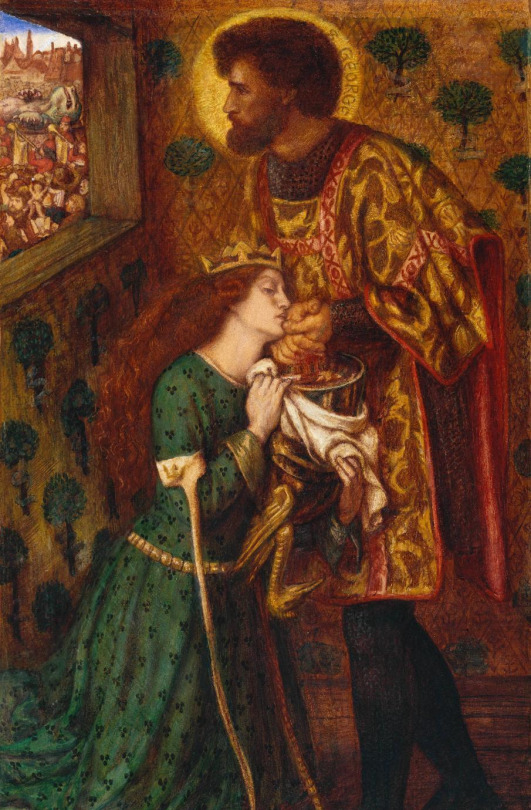
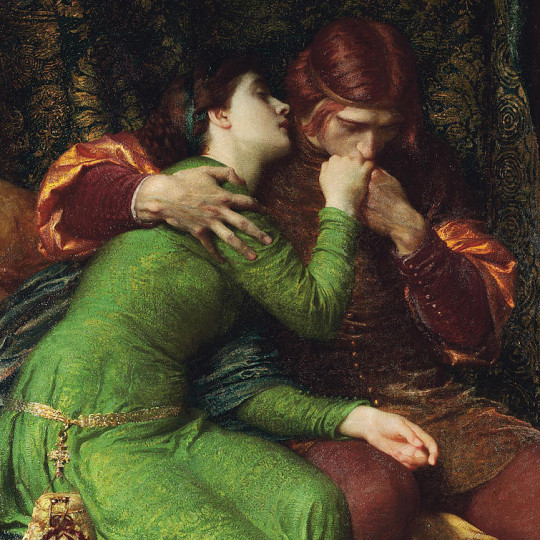

High Tier
These are less specific to our couple — they're a lady and a knight, but they're not outright our two. The details are a bit off, but it has excellent vibes; it feels like them.
The Meeting on the Turret Stairs (1864) by Frederic William Burton
The elbow kissing is chaste and ravenous, and it makes me insane.
The Accolade (1901) by Edmund Blair Leighton
A straightforward, formal depiction of their power dynamic: a knight kneeling at his lady's feet, and her the clement queen bestowing status upon him.
La Belle Dame sans Merci (c. 1901) by Frank Dicksee
A more kinky depiction of their dynamic. This feels like The Knight of the Cart, Guinevere jerking Lancelot around. (One time she asks him to loose a tourney just as a test, just because she enjoys watching him submit to her.)



Mid Tier
Nothing wrong with them, but they don't stand out. They contain neither specific details, nor vibes that particularly speak to me.
God Speed (1900) by Edmund Blair Leighton
A lady giving a knight her favor is always good, but it doesn't stand out to me.
My Fair Lady (1914) by Edmund Blair Leighton
The "loyal waiting attendant" thing is good, but it doesn't stand out to me.
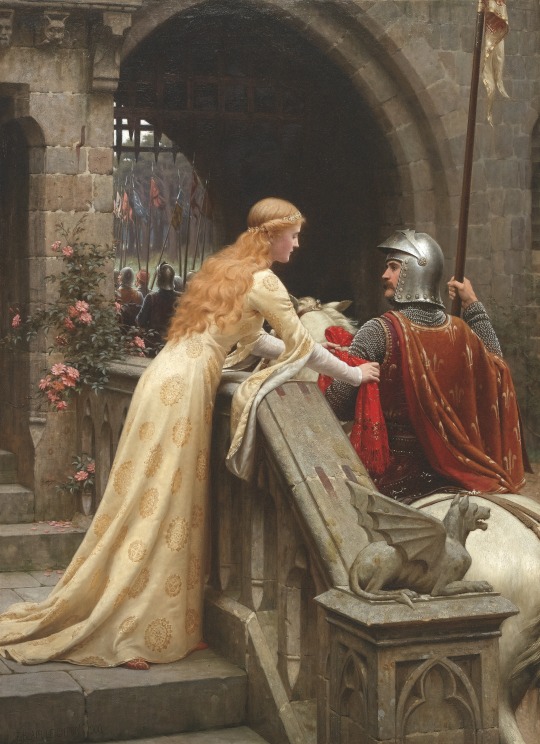
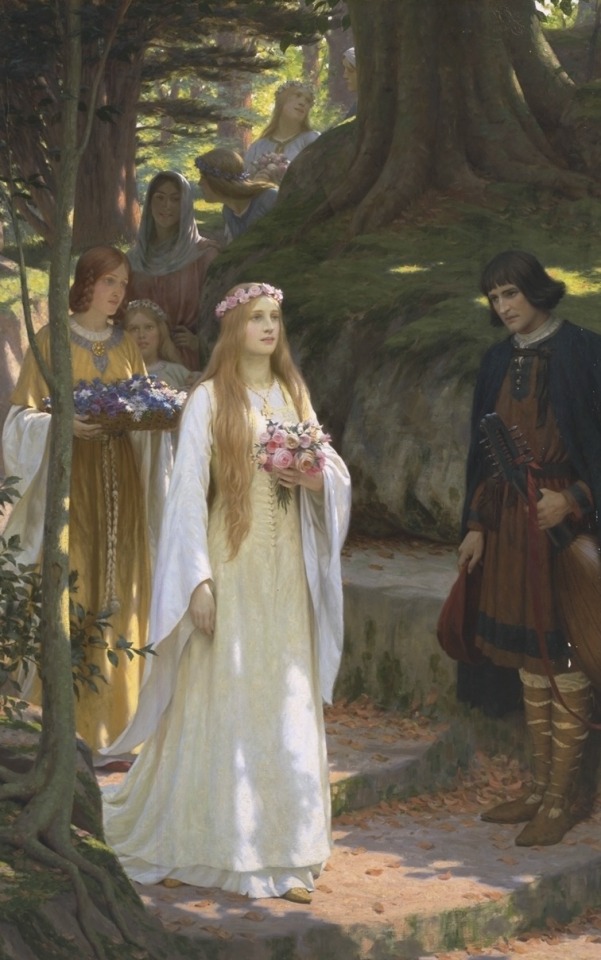
Nah Tier
These are too overtly sexual. It's not the right vibe.
These two are both iterations on "knight rescues lady who was sexually victimized by someone else." That notion is not wrong for our couple per se, but this feels off. The painter viewed it with horny eyes, and that's all I'm getting. It doesn't communicate how our characters would approach that same situation.
Chivalry (1885) by Frank Dicksee
The Knight Errant (1870) by John Everett Millais

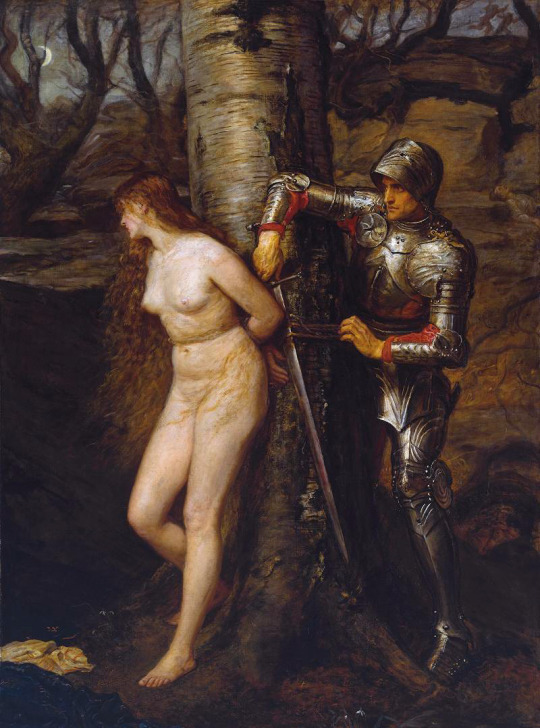
These three are iterations on "lady tries to seduce knight in a forward, overt way." That's not our pair.
Lamia (1905) by John William Waterhouse
This is the closest one from this tier. The "I'm begging you" pose has vibes I could almost see with Alicent assigning Criston a task. She's half actually desperate, half just trying to make him feel like she is so that he'll be all protective and loyal. But the horny shoulder is Not Them™.
La Belle Dame sans Merci (1893) by John William Waterhouse
Knight and Maiden (c. 1860s) by George Frederic Watts
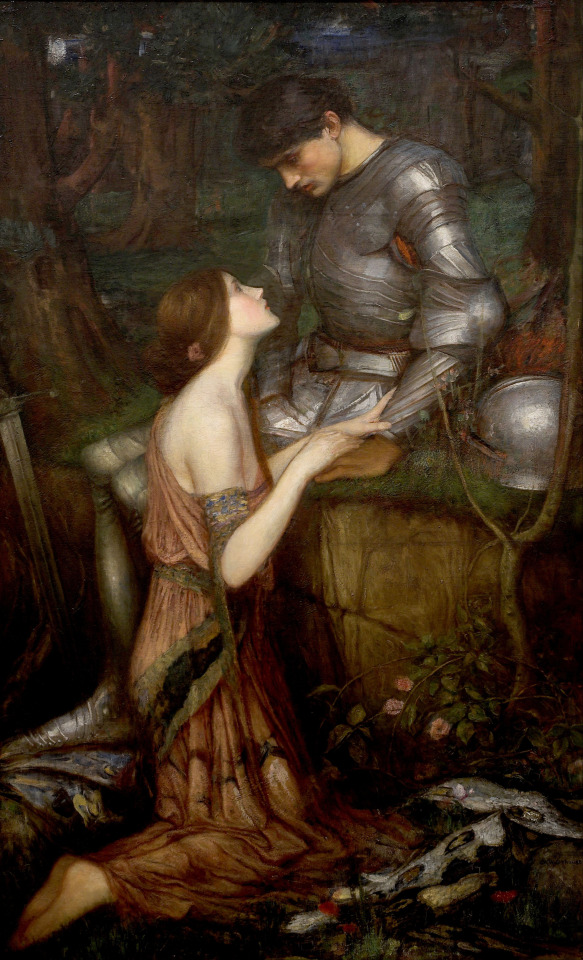
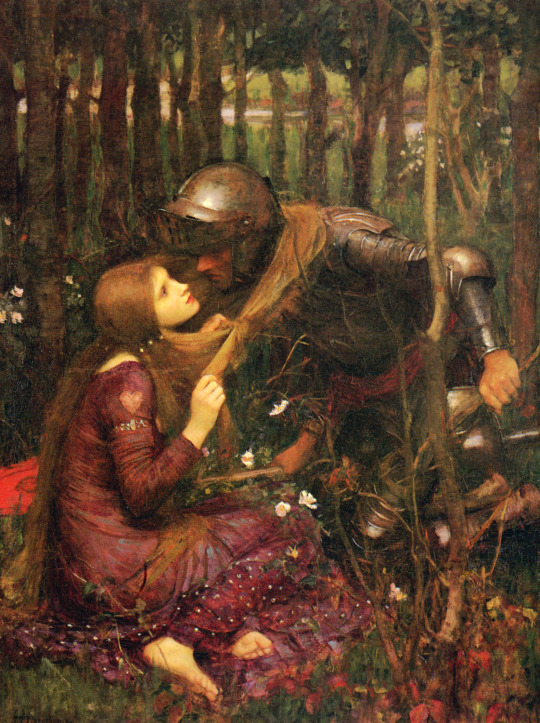
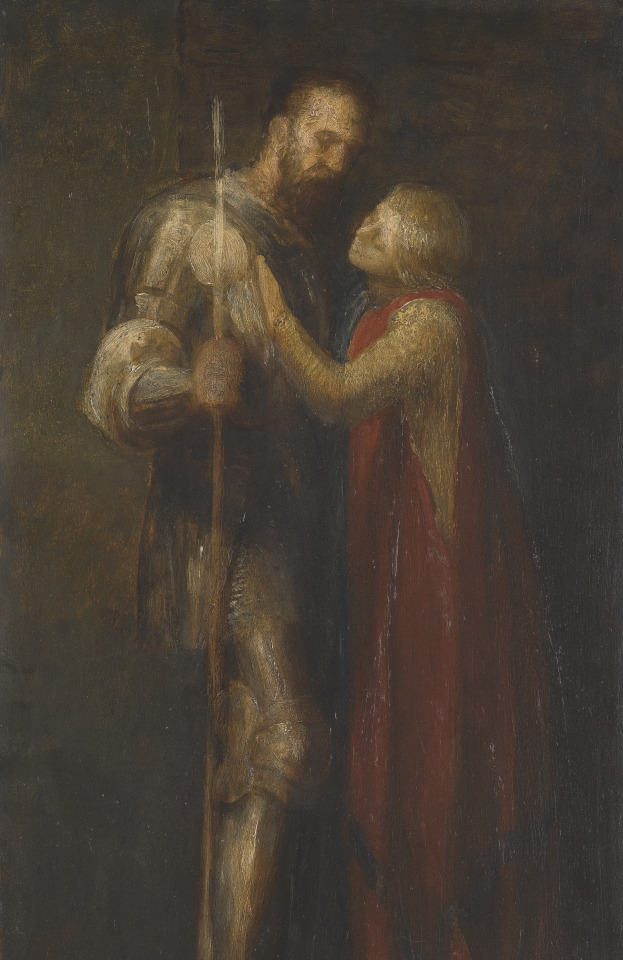
14 notes
·
View notes
Note
Hello! How are you?
I am reading about political parties during the Regency era and I have a question. Which of Austen's characters do you think are Whigs and which are Tories?
You really going to force me to relearn what Whigs and Tories were? Cruel, cruel nonnie. I'm going to cheat, this is from my favourite thesis on Jane Austen, Above the Vulgar Economy:
As Josephine Ross in Jane Austen: A Companion maintains,
The clear-cut distinctions of modern parliamentary politics had yet to emerge; and while the Whigs in the House of Commons tended to represent the interests of the aristocracy and upper classes, as well as expressing liberal ideals, the Tories – with their broad adherence to the more traditionally middle-class principles of upholding the Crown and keeping disaffection in check – were more identified with the landed gentry, and educated, but modestly situated, families such as the Austens.
At the time, the two party system was still evolving, and there was a great deal of dissention in the ranks. There were reactionaries, reformers and radical members in both parties. There were conservative, moderate and liberal Tories, and the Whig party was factionalized into Portland Whigs, Rockingham Whigs, Benthamites and Foxites to name a few.
Also, I have gotten the impression from reading other novels (eg. Wives & Daughters by Elizabeth Gaskell) from the time that often people knew which party their family voted for, but knew almost nothing else. Something that totally still happens today!
Here is another great passage:
In fact, when Pride & Prejudice was originally written as First Impressions in 1796 and 1797, Austen‟s novel appears to have been taking a stand in favor of two controversial economic proposals being debated in the House of Commons and in the press, a national minimum wage and Poor Law reform, thus Pride & Prejudice was
much more than a satire of manners but was also a political critique of Jane Austen's society. Both proposals were championed at the time by Tory Prime Minister William Pitt, the Younger and supported by liberal Tories and moderate Whigs. Both proposals were vehemently opposed by reactionary Tories and radical Whigs. The eligible bachelors in Pride & Prejudice are all associated with the Whig party, as is Lady Catherine de Bourgh, but the characters, like the Whigs in the House of Commons, have very different attitudes towards money and the working class.
Additionally, Austen's contemporaries would have known that Elizabeth Bennet's agricultural county, Hertfordshire, was, at least for the working class, the poorest county in England, just as Fitzwilliam Darcy's Derbyshire, financially stimulated by the Industrial Revolution, was the richest county, and Lady Catherine de Bourgh‟s Kent was a mixed county that varied enormously, from parish to parish, in prevailing wages and in treatment of the poor. The admirable Whig characters, like Fitzwilliam Darcy and Charles Bingley, are kindly and generous, while the radical Whig, Lady Catherine de Bourgh, is selfish and stingy, and George Wickham is simply an opportunist and a scoundrel. By its presentation of the different Whig characters, the text appears to be appealing to Whigs to be generous to the working class and encouraging Tories to look approvingly on those Whigs who are willing to financially support the poor.
Pride and Prejudice also includes a large number of characters who are servants, many identified by name. As most of them have no dialogue and do nothing to forward the plot, their presence in the novel at all may seem curious, but the depiction of the working class in Pride and Prejudice is more subtle to the modern reader than it would have been to Austen‟s original readers. The servants in Pride and Prejudice refute the assumptions of prominent Whig economists and politicians, Edmund Burke, Frederic Eden and Patrick Colquhoun, who depicted the lower class as ignorant, wasteful and immoral. Lady Catherine‟s financial neglect of the poor in Kent conforms to the economists‟ advice based on their assumptions that the working class was already adequately compensated for its labor and that poverty was the result of the irresponsible behavior of the poor. In stark contrast, Fitzwilliam Darcy‟s generosity to the poor in Derbyshire serves as a model response to poverty, and the general prosperity of Darcy‟s home county suggests that the solution to poverty is a combination of higher wages and liberal charity, exactly what the Prime Minister was proposing in 1797.
The general impression that I have gotten is that both Whigs and Tories were relatively ineffective. Anyway, a pretty clear answer for one character:
Pride and Prejudice‟s hero is almost certainly a Whig as well since the choice of the name, Fitzwilliam Darcy, is highly suggestive. Lord Fitzwilliam, later Earl Fitzwilliam, was from the north of England and, as historian William Hague describes him, one of the “Three great Earls of the Whig aristocracy”
Anywho, I'm not going to go through and sort them all since it seems fairly ambiguous who would be affiliated with which party. Also, almost everyone on earth holds some views that are extremely contradictory, so it's impossible to tell.
#question response#whigs vs. tories#someone with a better grasp on politics can answer this if they wish#I encourage everyone to read the extremely long thesis I'm quoting#It's amazing
25 notes
·
View notes
Text
Looking into the Garden
Life and Love

Geraniums by Childe Hassam
Portrait by a Neighbour
Before she has her floor swept
Or her dishes done,
Any day you’ll find her
A-sunning in the sun!
It’s long after midnight
Her key’s in the lock,
And you never see her chimney smoke
Till past ten o’clock!
She digs in her garden
With a shovel and a spoon,
She weeds her lazy lettuce
By the light of the moon.
She walks up the walk
Like a woman in a dream,
She forgets she borrowed butter
And pays you back cream!
Her lawn looks like a meadow,
And if she mows the place
She leaves the clover standing
And the Queen Anne’s lace!
—Edna St. Vincent Millay

Paysage au Bord du Lez by Frederic Bazille
Heartsease Country
TO ISABEL SWINBURNE
The far green westward heavens are bland,
The far green Wiltshire downs are clear
As these deep meadows hard at hand:
The sight knows hardly far from near,
Nor morning joy from evening cheer.
In cottage garden-plots their bees
Find many a fervent flower to seize
And strain and drain the heart away
From ripe sweet-williams and sweet-peas
At every turn on every way.
But gladliest seems one flower to expand
Its whole sweet heart all round us here;
’Tis Heartsease Country, Pansy Land.
Nor sounds nor savours harsh and drear
Where engines yell and halt and veer
Can vex the sense of him who sees
One flower-plot midway, that for trees
Has poles, and sheds all grimed or grey
For bowers like those that take the breeze
At every turn on every way.
Content even there they smile and stand,
Sweet thought’s heart-easing flowers, nor fear,
With reek and roaring steam though fanned,
Nor shrink nor perish as they peer.
The heart’s eye holds not those more dear
That glow between the lanes and leas
Where’er the homeliest hand may please
To bid them blossom as they may
Where light approves and wind agrees
At every turn on every way.
Sister, the word of winds and seas
Endures not as the word of these
Your wayside flowers whose breath would say
How hearts that love may find heart’s ease
At every turn on every way.
—Charles Algernon Swinburne
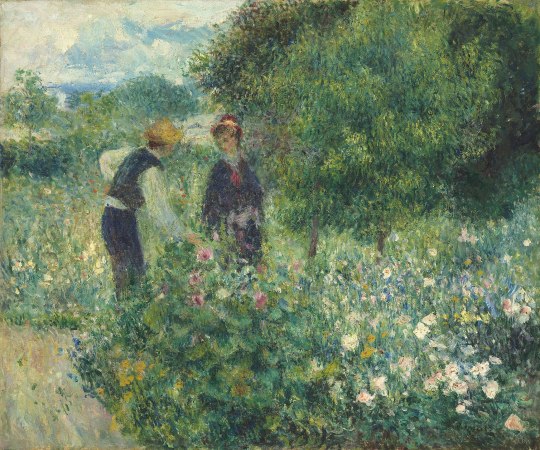
Picking Flowers by Auguste Renoir
The Flower's Name
Here's the garden she walked across,
Arm in my arm, such a short while since:
Hark, now I push its wicket, the moss
Hinders the hinges and makes them wince!
She must have reached this shrub ere she turned,
As back with that murmur the wicket swung;
For she laid the poor snail, my chance foot spurned,
To feed and forget it the leaves among.
Down this side of the gravel-walk
She went while her robe's edge brushed the box:
And here she paused in her gracious talk
To point me a moth on the milk-white phlox.
Roses, ranged in valiant row,
I will never think that she passed you by!
She loves you, noble roses, I know;
But yonder, see, where the rock-plants lie!
This flower she stopped at, finger on lip,
Stooped over, in doubt, as settling its claim;
Till she gave me, with pride to make no slip,
Its soft meandering Spanish name:
What a name! Was it love or praise?
Speech half-asleep or song half-awake?
I must learn Spanish, one of these days,
Only for that slow sweet name's sake.
Roses, if I live and do well,
I may bring her, one of these days,
To fix you fast with as fine a spell,
Fit you each with his Spanish phrase;
But do not detain me now; for she lingers
There, like sunshine over the ground,
And ever I see her soft white fingers
Searching after the bud she found.
Flower, you Spaniard, look that you grow not,
Stay as you are and be loved forever!
Bud, if I kiss you 't is that you blow not,
Mind, the shut pink mouth opens never!
For while it pouts, her fingers wrestle,
Twinkling the audacious leaves between,
Till round they turn and down they nestle—
Is not the dear mark still to be seen?
Where I find her not, beauties vanish;
Whither I follow her, beauties flee;
Is there no method to tell her in Spanish
June 's twice June since she breathed it with me?
Come, bud, show me the least of her traces,
Treasure my lady's lightest footfall!
—Ah, you may flout and turn up your faces—
Roses, you are not so fair after all!
—Robert Browning

Still Life with Flowers by Edouard Manet
#literature#poetry#dark academia#light academia#classic#inspiration#books & libraries#classic academia#pierre auguste renoir#childe hassam#algernon charles swinburne#edna st vincent millay#robert browning#edouard manet#frederic bazille
12 notes
·
View notes
Note
anti-propaganda for Eternal Sonata because boy is it ever a game and also its representative lost his poll: within the game's first like hour you learn a) that magic, in this game's world, is a sign of impending death, and b) that the world itself is Actual (fictionalized) Polish Composer Frederic Chopin (Sir Appearing In This Poll)'s (dying) fever dream. i'm 75% sure both of these facts are given to you before the battle tutorial. i so desperately want this to get a switch remake/remaster so some poor soul working on the nintendo directs gets to explain these plot details on a live feed.
he's the final boss by the way. the game ends with you beating up Actual (fictionalized) Polish Composer Frederic Chopin so he doesn't wake up and thus the game's world keeps existing. it is one of the funniest things bamco has ever given us imo.
(it's been a while since i played, but from what i remember the battle system was genuinely fun, too! i just love noting the plot choices because Boy Are They Choices)
^
33 notes
·
View notes
Text
I think I should make a list of my favorite TTS characters as well!
1. Pascal: Most loyal companion ever! No matter how many times Rapunzel forgets him, he was always there ❤️.
2. Maximus: He's the hero of the story, you can't convince me otherwise. Without him, the gang would get into so much trouble, especially Eugene; he would die like millions of time! 🤣
3. Lance: He was so sweet and innocent and cute and loyal and...to be continued.
4. Kierra and Catalina: I put them together since they are a package deal! They were sooooo adorable.
5. Shorty: He taught me the importance of remaining indifferent to my overwhelming emotions! 😌
6. Arianna: "Plus est en vous"; best quote ever, she is a great mother!
7. Frederic: I don't know why so many people hate him; that poor man was suffering from trauma, I can relate to him. People blame him for being over-protective, overbearing, over-controlling, but I have a question to them; have you ever heard of Asian parenting? If you had, you would never complain again!
8. Adira: Oh, I just love warrior kinda ladies!
9. Attila: He's so me, poor, and neglected! 😥
10. Honorable mentions: I think, uncle Monty, Vigor, the nameless captain, I can't decide; there were so many lovely characters!
#pixiesdiary#tangled#rapunzel#eugene fitzherbert#tangled the series#rapunzel's tangled adventure#tts#rta#cassandra#varian#uncle Monty#vigor#Attila#Arianna#king frederic#Pascal#maximus#Kierra#Catalina#it's a sarcasm in case you don't get it
14 notes
·
View notes
Text

Blessed Frederic Ozanam
1813-1853
Feast day: September 9
Founder of the Society of Saint Vincent de Paul
Bl. Frederic Ozanam was a French scholar that was challenged to put his faith into action and started the Society of St. Vincent de Paul. He always respected and served the poor which taught him that “ …charity must lead to efforts to remedy injustice. Charity and justice go together.” said by St. John Paul II at his beatification in 1997.
Prints, plaques & holy cards available for purchase here: (website)
36 notes
·
View notes
Text
Baby Cassandra and the Queen
Was going through my WIP folder, amongst the AUs and ideas, I found my folder of what I title 'writing-sketches'.
Bits of writing that aren't part of any bigger story.
Here's one of those about Baby Cass and Ari I thought you might enjoy!
Arianna lay in bed with a book and a four year old sleeping soundly on her chest.
Frederic arrived later than usual after no less than seven meetings. They’d both been plagued with work since getting back into their royal duties after a nowhere near long enough break. Though Frederic seemed to need the distraction. Not Arianna though, she didn’t want to let her sorrows come second to politics.
However, there were other tasks that were in her eyes a more productive distraction.
“You’ve kidnapped Cap’s child again?”
Arianna smiled. “Captain is out. You sent him away to personally deliver posters to every orphanage in every surrounding kingdom.”
“Ah, yes. I did.”
“She had a nightmare, poor baby was screaming and none of the servants were able to calm her.”
“None but you?”
“She just needed a mother’s touch,” Arianna whispered. Her fingers going through Cassandra’s hair, carefully detangling knots without so much as waking her.
Frederic nodded. “I still can’t believe that woman hasn’t returned to at least attempt to retrieve her child.”
Arianna hummed. “I told you, she was far too skinny, far too jumpy. That woman had no interest in her. She won’t take any risks.”
Frederic hummed. “Shall I return her to her room?”
Arianna shook her head. “Let her stay. Captain isn’t there, and she’s sleeping peacefully here.”
“As you wish, my love.” Frederic kissed Arianna gently on the cheek.
Arianna gently pulled the blanket further over Cassandra, ensuring the little girl wouldn’t get cold.
#little cassandra#queen arianna#king frederic#tts fic#rta fic#tts fanfic#tts fanfiction#rta fanfic#rta fanfiction#tangled the series fic#tangled the series fanfiction
12 notes
·
View notes